
Ashok Kumar, was an Indian actor who attained iconic status in Indian cinema. He was considered the first big star of Hindi cinema as well as the first lead actor to play an anti-hero. He also became the first star to reinvent himself, enjoying a long and hugely successful career as a character actor. He was a member of the cinematic Ganguly family. He was honoured in 1988 with the Dadasaheb Phalke Award, the highest national award for cinema artists, by the Government of India. He also received the Padma Bhushan in 1999 for his contributions to Indian cinema.

Mohammed Rafi was an Indian playback singer and musician. He is considered to have been one of the greatest and most influential singers of the Indian subcontinent. Rafi was notable for his versatility and range of voice; his songs varied from fast peppy numbers to patriotic songs, sad numbers to highly romantic songs, qawwalis to ghazals and bhajans to classical songs. He was known for his ability to mould his voice to the persona and style of the actor lip-syncing the song on screen in the movie. He received six Filmfare Awards and one National Film Award. In 1967, he was honored with the Padma Shri award by the Government of India. In 2001, Rafi was honoured with the "Best Singer of the Millennium" title by Hero Honda and Stardust magazine. In 2013, Rafi was voted for the Greatest Voice in Hindi Cinema in the CNN-IBN's poll.

Raj Kapoor, also known as Ranbir Raj Kapoor, was an Indian actor, film director and producer, who worked in Hindi cinema. He is considered one of the greatest and most influential actors and filmmakers in the history of Indian cinema, and has been referred to as The Greatest Showman of Indian Cinema and as the Charlie Chaplin of Indian Cinema.
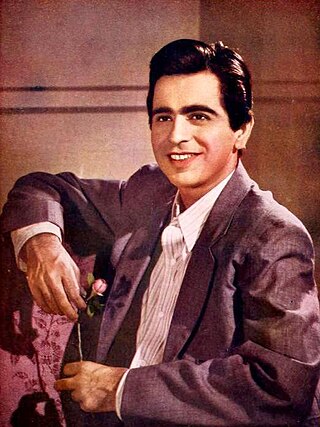
Dilip Kumar was an Indian actor who worked in Hindi cinema. Credited with pioneering method acting in cinema, after Motilal, he dominated the Indian cinema from late 1940s throughout 60s, being referred to as Abhinay Samrat. Kumar holds the record for most wins for the Filmfare Award for Best Actor and was also the inaugural recipient of the award. He holds the most dominant box-office record for a star in Hindi cinema with over 80% box-office successes and several long-standing gross records.
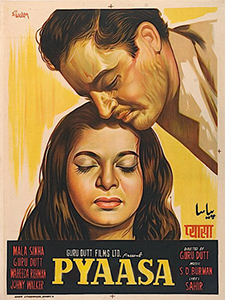
Pyaasa is a 1957 Indian Hindi drama film directed and produced by Guru Dutt, who stars alongside Mala Sinha, Waheeda Rehman, Rehman, and Johnny Walker. Set in Calcutta, it focuses on the disillusioned Urdu poet Vijay (Dutt), whose works are underestimated by publishers and panned for writing on social issues rather than romantic topics. The film follows his encounters with the golden-hearted prostitute Gulabo and his former girlfriend Meena (Sinha), how the former helps him to get his poetry published, the success of his works, and his romantic relationship with Gulabo.

Nimmi, was an Indian screen actress who achieved stardom in the 1950s and early 1960s in Hindi films. She was one of the leading actresses of the "golden era" of Hindi cinema.
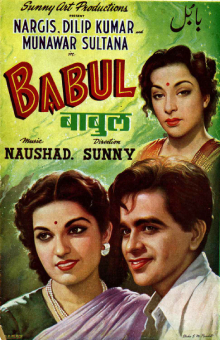
Babul is a 1950 Bollywood musical drama film directed by S.U. Sunny, produced and with music direction by Naushad. The film stars Dilip Kumar, Nargis, Munawar Sultana in pivotal roles. A box office success, the film became the 2nd highest earning film of 1950, earning an approximate gross of Rs. 12,500,000 and a net of Rs. 70,00,000.
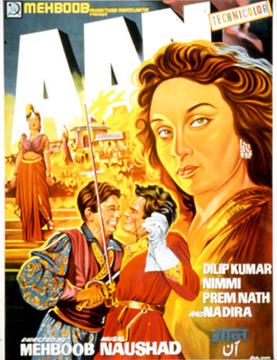
Aan, released as The Savage Princess in the United Kingdom and United States, is a 1952 Indian Hindi language adventure film, produced and directed by Mehboob Khan.

Baiju Bawra is a 1952 Hindi musical romantic drama film directed by Vijay Bhatt. Produced by Prakash Pictures, with story by Ramchandra Thakur and dialogues by Zia Sarhadi, Baiju Bawra was a musical "megahit" which had a mighty 100-week run in the theatres. Bhatt's decision to make a film based on classical music was met with scepticism by the Indian film industry due to its "lack of mass appeal", but the film and music turned out be an "overwhelming success".

Ganga Jamna, also transliterated as Ganga Jamuna or Gunga Jumna, is a 1961 Indian crime drama film, written and produced by Dilip Kumar, and directed by Nitin Bose, with dialogues written by Wajahat Mirza; Kumar later said that he also ghost-directed and edited the film. It stars Dilip Kumar with Vyjayanthimala and his real-life brother Nasir Khan in the leading roles. Set in the rural Awadh region of Northern India, the film tells the story of two impoverished brothers, Ganga and Jamna, and their poignancy and sibling rivalry on opposing sides of the law, one a dacoit criminal and the other a police officer. The film was also notable for its Technicolor production, use of the Awadhi dialect, and its rustic setting, being a defining example of the dacoit film genre. It was ranked 11th in Outlook Magazine's poll considering 25 leading Indian directors' vote for Bollywood's greatest films in 2003.
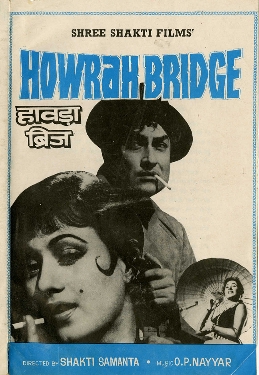
Howrah Bridge is a 1958 Indian Hindi-language crime thriller film directed by Shakti Samanta. The music for the film was composed by O. P. Nayyar. The plot focuses on Prem Kumar, a businessman from Rangoon, who travels to Calcutta to try and track down his brother's murderers. Madhubala stars as Edna, a cabaret dancer, in one of her most popular roles.

Dil Diya Dard Liya is a 1966 Hindi romance film based upon Emily Brontë's 1847 novel Wuthering Heights. The film is directed by Abdur Rashid Kardar and Dilip Kumar. The film stars Dilip Kumar, Waheeda Rehman, Rehman, Pran, and Johnny Walker. The music is by Naushad. The songs include "Koi Sagar Dil Ko Behlata Nahin", "Phir Teri Kahani Yaad Aayi", "Guzre Hain Aaj Ishq Mein", "Dilruba Maine Tere Pyar Mein". It inspired the 1983 Pakistani film Dehleez starring Nadeem, Shabnam, Afzal Ahmed and Agha Taalish and the 1985 Hindi movie Oonche Log. The film was Dilip Kumar's first outright flop in 15 years at the box-office.
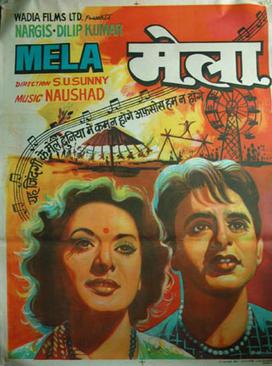
Mela is a 1948 Indian Hindi-language romantic tragedy film. It was produced by and directed by S.U. Sunny for Wadia Movietone. It starred Dilip Kumar, Nargis, Jeevan, Rehman and Nur Jehan. The film's music was composed by Naushad. Mukesh gave playback for Dilip in this film and one of the "Mukesh hits" was "Gaye Ja Geet Milan Ke". Mohammed Rafi's voice was used just once, for the popular song "Ye Zindagi Ke Mele", set in a fairground and picturised on a wandering mendicant at the start of the film. The lyrics of the songs were written by Shakeel Badayuni with story and dialogue by Azam Bazidpuri.
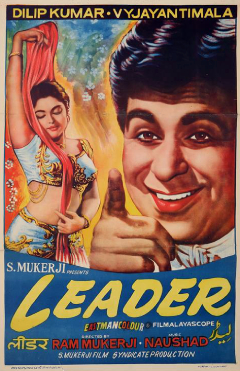
Leader is a 1964 Indian Hindi-language political drama film directed by Ram Mukherjee, produced by Sashadhar Mukherjee and written by Dilip Kumar. The film stars Dilip Kumar, Vyjayanthimala and Jayant. The film underperformed commercially.
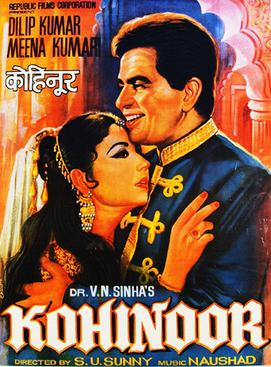
Kohinoor is a 1960 Bollywood action adventure film produced by V. N. Sinha and directed by S. U. Sunny. The film stars Dilip Kumar, Meena Kumari, Leela Chitnis and Kumkum. The film's music is by Naushad. A huge box-office success, it was the third-highest grossing Indian film of 1960.
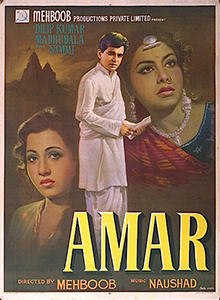
Amar (transl. "Immortal") is a 1954 Indian Hindi-language romantic drama film produced and directed by Mehboob Khan. Dealing with the controversial subject of rape, the film revolves around the titular upper-class lawyer, his feminist fiancé, the social worker Anju Roy (Madhubala), and Sonia (Nimmi), a poor milkmaid.
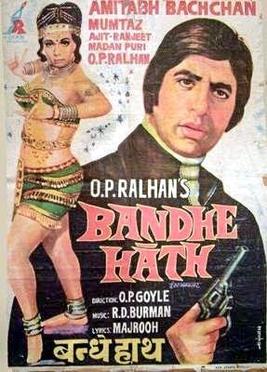
Bandhe Hath is a 1973 Hindi-language film produced and written by O. P. Ralhan. It stars Amitabh Bachchan, Mumtaz in lead roles, with Ajit, Ranjeet, Madan Puri, Asit Sen, O. P. Ralhan, Tun Tun, Pinchoo Kapoor in another roles. The film's music is by R. D. Burman and the lyrics by Majrooh Sultanpuri. The film is a remake of Shammi Kapoor film Mujrim (1958).

Leela Mishra was an Indian actress. She worked as a character actor in over 200 Hindi films for five decades, and is best remembered for playing stock characters such as aunts. She is best known for her role of "mausi" in the blockbuster Sholay (1975), Dil Se Mile Dil (1978), Baton Baton Mein (1979), Rajesh Khanna films such as Palkon Ki Chhaon Mein, Aanchal, Mehbooba, Amar Prem and Rajshri Productions hits such as Geet Gaata Chal (1975), Nadiya Ke Paar (1982) and Abodh (1984). Her career's best performance was in Naani Maa in 1981, for which she received Best Actress award at the age of 73.
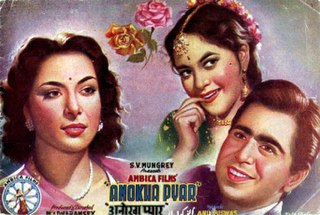
Anokha Pyar is a 1948 Indian Hindi language film. The film stars Dilip Kumar, Nargis, Nalini Jaywant in lead roles. The black and white romantic love triangle was directed by M. I. Dharamsey under the Ambika Films banner. The music was composed by Anil Biswas, who gave a then unknown young Lata Mangeshkar maximum songs to sing for the film. The rest of the cast included Sankatha Prasad, Mukri, Ved, Kesarbai, Habib and Sheikh.
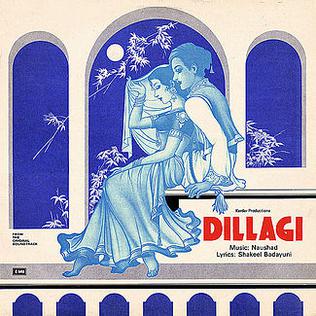
Dillagi is a 1949 Indian Bollywood film. The film was produced and directed by A. R. Kardar for his "Kardar Productions", and had music composed by Naushad. The film starred Suraiya and Shyam, alongside Chandabai, Sharda, Amar and Amir Banu. The story was a romantic tragedy and became commercially successful, being the fourth highest grossing film of the year.




















